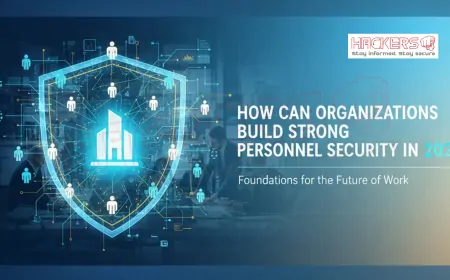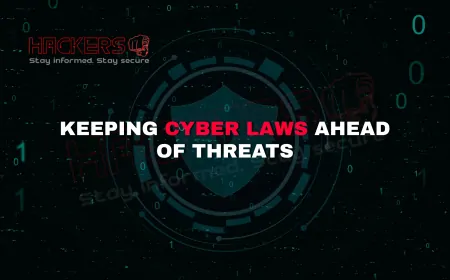How Do Cybersecurity Laws Protect Businesses from Hackers?
Imagine running a business where a single hacker could steal your customers’ personal information, drain your bank accounts, or shut down your operations. It’s a scary thought, but it’s a reality many businesses face today. Hackers are smarter than ever, using tricks like phishing emails or ransomware to exploit weaknesses. Thankfully, cybersecurity laws exist to help businesses fight back. These laws set rules to protect sensitive data, ensure accountability, and reduce the risk of cyberattacks. Whether you’re a small business owner or work for a large corporation, understanding how these laws shield your business from hackers is crucial. In this blog, we’ll break down the key cybersecurity laws, how they work, and why they’re your business’s first line of defense—all in a way that’s easy to grasp, even if you’re new to the topic.

Table of Contents
- What Are Cybersecurity Laws?
- How Cybersecurity Laws Protect Businesses
- Key Cybersecurity Laws Around the World
- Mechanisms of Protection
- Comparing Cybersecurity Laws
- Challenges for Businesses
- Conclusion
- Frequently Asked Questions (FAQs)
What Are Cybersecurity Laws?
Cybersecurity laws are regulations created by governments to ensure businesses protect sensitive data like customer information, financial records, or employee details from hackers. These laws set standards for security practices, such as using encryption (a way to scramble data so only authorized people can read it) or reporting data breaches. They also hold businesses accountable with fines or legal action if they fail to comply. By enforcing these rules, cybersecurity laws help businesses stay one step ahead of hackers, who might otherwise exploit weak systems to steal data or disrupt operations.
For businesses, these laws are like a playbook for building a strong defense against cyber threats. They cover industries like finance, healthcare, and e-commerce, ensuring that companies handling sensitive data take security seriously.
How Cybersecurity Laws Protect Businesses
Cybersecurity laws protect businesses in several practical ways, making it harder for hackers to succeed and helping companies recover if an attack happens.
- Mandating Security Measures: Laws require businesses to use tools like firewalls, encryption, and access controls to block hackers from accessing sensitive data.
- Breach Notification: Many laws demand that businesses notify customers and authorities quickly after a data breach, limiting damage and helping prevent further attacks.
- Accountability: Fines and penalties push businesses to prioritize cybersecurity, ensuring they invest in strong defenses rather than cutting corners.
- Customer Trust: By following these laws, businesses show customers they take data protection seriously, which helps maintain trust and loyalty.
- Risk Reduction: Compliance reduces the likelihood of successful cyberattacks, saving businesses from costly downtime or lawsuits.
These protections create a safer environment for businesses, reducing the financial and reputational damage hackers can cause.
Key Cybersecurity Laws Around the World
Different countries have their own cybersecurity laws, each designed to tackle specific threats. Here are some of the most important ones:
- General Data Protection Regulation (GDPR) – Europe: GDPR, effective since 2018, requires businesses to protect EU residents’ data with measures like encryption and to report breaches within 72 hours. It applies globally to any company handling EU data.
- Health Insurance Portability and Accountability Act (HIPAA) – USA: HIPAA ensures healthcare businesses secure patient data, using tools like access controls and audits to prevent unauthorized access.
- Gramm-Leach-Bliley Act (GLBA) – USA: GLBA requires financial institutions to safeguard customer data and disclose privacy policies, protecting against financial fraud.
- California Consumer Privacy Act (CCPA) – USA: CCPA gives California residents rights to access and delete their data, pushing businesses to secure personal information.
- China’s Cybersecurity Law (CSL): Enacted in 2017, CSL mandates data localization (storing data within China) and security assessments to protect against hacks.
- Singapore’s Personal Data Protection Act (PDPA): PDPA requires businesses to get consent for data use and report breaches, similar to GDPR but tailored to Singapore’s needs.
- Brazil’s General Data Protection Law (LGPD): Effective since 2020, LGPD mirrors GDPR, requiring businesses to protect personal data and grant consumer rights.
These laws vary in focus some prioritize privacy, others national security but all aim to make businesses less vulnerable to hackers.
Mechanisms of Protection
Cybersecurity laws use specific tools and requirements to help businesses fend off hackers. Here’s how they work:
- Encryption: Laws like GDPR and HIPAA require businesses to encrypt data, making it unreadable to hackers without a special key.
- Access Controls: Regulations mandate limiting who can access sensitive data, ensuring only authorized employees can view or edit it.
- Regular Audits: Laws like HIPAA require businesses to regularly check their systems for weaknesses, fixing them before hackers can exploit them.
- Incident Response Plans: Many laws require businesses to have a plan for handling breaches, including notifying customers and authorities quickly.
- Training Programs: Laws often push businesses to train employees on spotting phishing emails or other common hacker tricks.
By enforcing these mechanisms, laws create a structured approach to cybersecurity, helping businesses stay proactive rather than reactive.
Comparing Cybersecurity Laws
Not all cybersecurity laws protect businesses in the same way. Here’s a table comparing key laws and their protective features:
| Law | Region | Key Protection | Applies To | Penalties |
|---|---|---|---|---|
| GDPR | Europe | Encryption, breach notification | All businesses handling EU data | Up to €20M or 4% of revenue |
| HIPAA | USA | Access controls, audits | Healthcare businesses | Up to $1.5M per violation |
| GLBA | USA | Data safeguards, privacy notices | Financial institutions | Fines, legal action |
| CSL | China | Data localization, assessments | All businesses in China | Up to ¥5M (~$700K) |
| LGPD | Brazil | Consent, data rights | Businesses handling Brazilian data | Up to 2% of revenue |
GDPR and LGPD focus on broad data protection, while HIPAA and GLBA are industry-specific. CSL emphasizes government oversight, which can limit business flexibility but strengthens national security.
Challenges for Businesses
While cybersecurity laws offer protection, complying with them isn’t always easy. Here are some common hurdles:
- High Costs: Implementing encryption, hiring cybersecurity experts, and conducting audits can be expensive, especially for small businesses.
- Complex Regulations: Businesses operating globally must navigate conflicting laws, like GDPR’s data transfer rules versus CSL’s data localization.
- Human Error: Employees might accidentally click phishing links, exposing the business to hackers despite compliance efforts.
- Evolving Threats: Hackers constantly develop new techniques, requiring businesses to update systems faster than laws can adapt.
Despite these challenges, compliance is non-negotiable failing to follow laws can lead to fines, lawsuits, and lost customer trust.
Conclusion
Cybersecurity laws are a vital shield for businesses against hackers, enforcing strong security practices like encryption, access controls, and breach notifications. From GDPR’s global reach to HIPAA’s healthcare focus, these laws ensure businesses take data protection seriously, reducing the risk of costly cyberattacks. While compliance can be challenging due to costs and complexity, the benefits protection from hackers, customer trust, and legal accountability far outweigh the effort. For businesses, understanding and following these laws isn’t just about avoiding fines; it’s about building a secure foundation in a world where cyber threats are ever-present. Stay informed, stay compliant, and keep hackers at bay.
Frequently Asked Questions (FAQs)
What are cybersecurity laws?
Cybersecurity laws are regulations that require businesses to protect sensitive data from hackers using measures like encryption and audits.
How do cybersecurity laws protect businesses?
They mandate security practices, require breach notifications, and enforce penalties, reducing the risk of successful cyberattacks.
What is GDPR?
GDPR is a European law that requires businesses to protect EU residents’ data and report breaches within 72 hours.
Does GDPR apply to non-European businesses?
Yes, GDPR applies to any business handling EU residents’ data, regardless of location.
What does HIPAA require from businesses?
HIPAA requires healthcare businesses to secure patient data with encryption, access controls, and regular audits.
How does GLBA protect financial businesses?
GLBA mandates financial institutions to safeguard customer data and provide clear privacy policies to prevent fraud.
What is a data breach?
A data breach occurs when hackers gain unauthorized access to sensitive information, like customer or financial data.
Why is encryption important?
Encryption scrambles data, making it unreadable to hackers without a key, protecting it from theft.
What is China’s CSL?
China’s Cybersecurity Law requires businesses to store data locally and conduct security assessments to prevent hacks.
How does CCPA help businesses?
CCPA requires businesses to protect consumer data and grant rights like data deletion, reducing breach risks.
What happens if a business ignores cybersecurity laws?
Non-compliance can lead to hefty fines, lawsuits, and loss of customer trust.
Do small businesses need to follow cybersecurity laws?
Yes, any business handling sensitive data must comply, regardless of size.
What is a phishing attack?
A phishing attack is when hackers use fake emails or messages to trick employees into revealing sensitive information.
How do laws like GDPR enforce breach notifications?
GDPR requires businesses to notify authorities and customers within 72 hours of a data breach.
Can cybersecurity laws prevent all hacks?
No, but they significantly reduce risks by enforcing strong security practices and preparedness.
What is an access control?
Access control limits who can view or edit sensitive data, ensuring only authorized personnel have access.
Why is compliance costly for businesses?
Compliance requires investments in encryption, audits, training, and cybersecurity experts.
How does LGPD protect businesses in Brazil?
LGPD requires businesses to secure personal data and grant consumer rights, reducing breach risks.
Do cybersecurity laws help customer trust?
Yes, compliance shows customers that a business takes data protection seriously, building trust.
How can businesses stay compliant?
Businesses can stay compliant by using encryption, training staff, conducting audits, and staying updated on laws.
What's Your Reaction?










































































